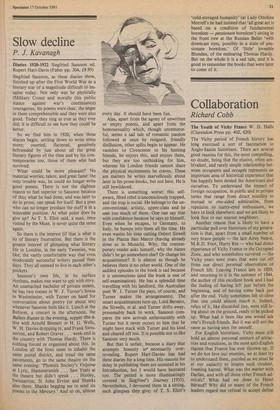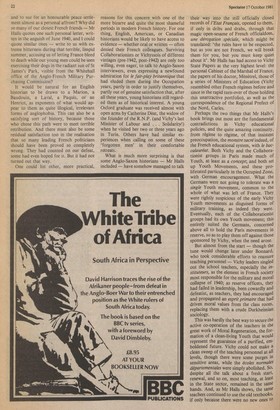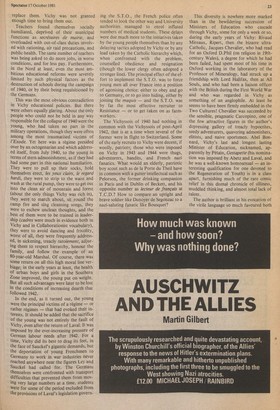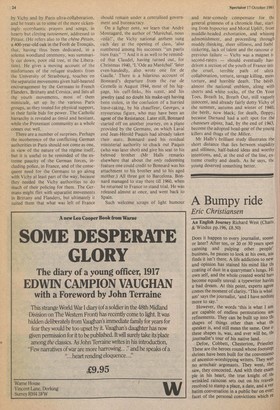Collaboration
Richard Cobb
The Youth of Vichy France W. D. Halls (Clarendon Press pp. 492, /20) The Vichy period of French history has long exercised a sort of fascination to Anglo-Saxon historians. There are several good reasons for this, the most compelling, no doubt, being that the elusive, often ambivalent, and rarely simple relationship between occupants and occupes represents an important area of historical experience that has happily been denied the Americans and ourselves. To understand the impact of foreign occupation, in public and in private terms that range from direct hostility to mutual or one-sided admiration, from repulsion to starry-eyed enthusiasm, we have to look elsewhere; and we are likely to look first to our nearest neighbour.
Another reason that is likely to have a particular pull over historians of my generation is that, apart from a small number of very brave people — the late Airey Neave, M.R.D. Foot, Harry Roe — who had direct experience of Vichy France or the Occupied Zone, and who nonetheless survived — the Vichy years were years that were cut off from our direct personal observation of French life. Leaving France late in 1939, and returning to it in the summer of 1944, the author of this excellent book and I had the feeling of having left just before. the beginning, and of having come back just after the end. Vichy sometimes felt so close that one could almost touch it. Indeed, relics of it, like discarded tins, were still lying about on the ground, ready to be picked up. What had it been like one would ask one's French friends. But it was still not the same as having seen for oneself.
For English historians, Vichy must still hold an almost personal mixture of attraction and repulsion, as the most anti-English regime that France has ever thrown up. If we do not love our enemies, we at least try to understand them, puzzled as we must be at our capacity to inspire such virulent, foaming hatred. What was the matter with Darlan, and with all those other French admirals? What had we done to Henri Beraud? Why did so many of the French leaders regard our refusal to accept defeat and to sue for an honourable peace settlement almost as a personal affront? Why did so many of our closest French friends — Mr Halls quotes one such personal letter, written in the anguish of June 1940, and 1 could quote similar ones — write to us with extreme bitterness during that terrible, limpid summer, accusing us of letting France bleed to death while our young men could be seen exercising their dogs in the radiant sun of St James's Park, visible from the Whitehall office of the Anglo-French Military Purchasing Commission?
It would be natural for an English historian to be drawn to a Marion, a Baudouin, a Laval, a Paquis, or an Henriot, as exponents of what would appear to them as quite illogical, irrelevant forms of anglophobia. This can also be a satisfying sort of history, because those who chose this path were to meet terrible retribution. And there must also be some residual satisfaction too in the realisation that so many leading French politicians should have been proved so completely wrong. They had counted on our defeat, some had even hoped for it. But it had not turned out that way.
One could list other, more practical, reasons for this concern with one of the more bizarre and quite the most shameful periods in modern French history. For one thing, English, American, or Canadian historians would be likely to have access to evidence — whether oral or written — often denied their French colleagues. Surviving Collaborationists or Vichyssois of different vintages (pre-1942, post-1942) are only too willing, even eager, to talk to Anglo-Saxon interviewers, even expressing a newfound admiration for le fair-play britannique that had eluded them during the Occupation years, partly in order to justify themselves, partly out of genuine satisfaction that, after all these years, young historians still regarded them as of historical interest. A young Oxford graduate was received almost with open arms by Catherine Deat, the widow of the founder of the R.N.P. (and Vichy's last Minister of Labour and . . . Solidarity!) when he visited her two or three years ago in Turin. Others have had similar experiences when calling on some of these 'forgotten men' in their comfortable retreats.
What is much more surprising is that some Anglo-Saxon historians — Mr Halls included — have somehow managed to talk their way into the still officially closed records of l'Etat Francais, opened to them, if only in dribs and drabs, through that magic open-sesame of French officialdom, une derogation speciale, which might be translated: 'the rules have to be respected, but as you are not French, we will break them for you, but you must keep quiet about it'. Mr Halls has had access to Vichy State Papers at the very highest level: the personal Cabinet of the Marshal of France, the papers of his doctor, Menetrel, those of a series of Ministers of Education (Vichy resembled other French regimes before and since in the rapid turn-over of those holding this unattractive portfolio), as well as the correspondence of the Regional Prefect of the Nord, Caries.
Perhaps the two things that Mr Halls's book brings out most are the fundamental contradictions in Vichy educational policies, and the quite amazing continuity, from regime to regime, of that insistent preoccupation, the monstre sacre indeed, of the French educational system, with le baccalaureat. Both Vichy and the Collaborationist groups in Paris made much of Youth, at least as a concept; and both set up Youth Movements, and these proliferated particularly in the Occupied Zone, with German encouragement. What the Germans were not going to tolerate was a single Youth movement, common to the whole of what was left of France. They were rightly suspicious of the early Vichy Youth movements as disguised forms of military training, as indeed they were. Eventually, each of the Collaborationist groups had its own Youth movement; this entirely suited the Germans, concerned above all to hold the Paris movements in reserve, so as to play them off against those sponsored by Vichy, when the need arose.
But almost from the start — though the tune would change later under Bonnard, who took considerable efforts to reassure teaching personnel — Vichy leaders singled out the school teachers, especially the instituteurs, as the element in French society most responsible for the military and moral collapse of 1940; as reserve officers, they had failed in leadership, been cowardly and defeatist, as teachers, they had encouraged and propagated an esprit primaire that had driven moral values from the class room, replacing them with a crude Durkheimian sociology.
This was hardly the best way to secure the active co-operation of the teachers in the great work of Moral Regeneration, the formation of a clean-living Youth that would represent the guarantee of a purified, emboldened future. Vichy could not make a clean sweep of the teaching personnel at all levels, though there were some purges 111 sensitive areas, while the ecoles normales departementales were simply abolished. So, despite all the talk about a fresh start, renewal, and so on, most teaching, at least in the State sector, remained in the same hands. And, as Mr Halls shows, the same teachers continued to use the old textbooks, if only because there were no new ones to replace them. Vichy was not granted enough time to bring them out.
Teachers found themselves socially humiliated, deprived of their municipal functions as secretaires de mairie, and overloaded with out-of-class duties involved with rationing, air raid precautions, and public health. The same number of teachers was being asked to do more jobs, in worse conditions, and for less pay. Furthermore, in the Nord at least, even the most ambitious educational reforms were severely limited by such physical factors as the destruction of schools during the campaign of 1940, or by their being requisitioned by the Germans.
This was the most obvious contradiction in Vichy educational policies. But there were others equally glaring. About the only people who could not be held in any way responsible for the collapse of 1940 were the young, who had taken no part in the military operations, though they were often among the most traumatised victims of l'Exode. Yet here was a regime presided over by an octogenarian and which addressed itself, from July 1940, to the young in terms of stern admonishment, as if they had had some part in this national humiliation. They were to pull up their socks, hold themselves erect, les yeux clairs, le regard hardi, they were to strip to the waist and wash at the rural pump, they were to get out into the clean air of mountain and forest (about the only things Vichy was rich in), they were to march about, sit round the camp fire and sing cleansing songs, they were to eschew unclean thoughts, and the best of them were to be trained in leadership (cadres were much in evidence both in Vichy and in Collaborationist vocabulary), they were to avoid dancing and frivolity, worst of all, they were frequently addressed, in sickening, treacly tutoiement, adjuring them to respect hierarchy, honour the family, and follow the example of an 80-year-old Marshal. Of course, there was some return on all this high moral line verbiage; in the early years at least, the health of urban boys and girls in the Southern Zone improved, the young put on weight. But all such advantages were later to be lost in the conditions of increasing dearth that followed 1942.
In the end, as it turned out, the young were the principal victims of a regime —or in terests. regimes — that had evoked their It should be added that the sacrifice of the young was not entirely the fault of Vichy, even after the return of Laval. It was imposed by the ever-increasing pressure of German labour needs after 1942. For .a time, Vichy did its best to drag its feet, in the face of Sauckel's gigantic demands, but the deportation of young Frenchmen to Germany to work in war industries never reached anywhere near the figures Ley and Sauckel had called for. The Germans themselves were confronted with transport difficulties that prevented them from moving very large numbers at a time, students were for some of the period excluded from the provisions of Laval's legislation govern ing the S.T.O., the French police often tended to look the other way and University authorities managed to enrol inflated numbers of medical students. These delays were due much more to the initiatives taken by the young people themselves than by any delaying tactics adopted by Vichy or by any lead taken by the Catholic hierarchy which, when confronted with the problem, counselled obedience and resignation (though the lower clergy often adopted a stronger line). The principal effect of the effort to implement the S.T.O. was to force young men all over France into a position of agonising choice: either to obey and go to Germany, or to go into hiding, either by joining the maquis — and the S.T.O. was by far the most effective recruiter to Resistance — or to get taken on as farmworkers.
The Vichyssois of 1940 had nothing in common with the Vichyssois of post-April 1942, that is at a time when several of the former were in flight to Switzerland. Some of the early recruits to Vichy were decent, if woolly, patriots; those who were imposed on Vichy in 1943 and 1944 were thugs, adventurers, bandits, and French nazi fanatics. What would an elderly, patriotic boy scout such as de la Porte du Theil have in common with a gutter intellectual such as Pelorson, the former drinking companion in Paris and in Dublin of Beckett, and his opposite number as lecteur de francais at T.C.D.? How to compare an upright and brave soldier like Dunoyer de Segonzac to a nazi-saluting fanatic like I3ousquet? This diversity is nowhere more marked than in the bewildering succession of Ministers of Education who cascade through Vichy, some for only a week or so, during the early years of Vichy: Rivaud Mireaux, Ripert, then the bizarre ultraCatholic, Jacques Chevalier, who had read for an Oxford D.Phil (on religion in 19thcentury Wales), a degree for which he had been failed, had spent most of his time in Oxford working in the laboratory of the Professor of Mineralogy, had struck up a friendship with Lord Halifax, then at All Souls, and who had been a liaison officer with the British during the First World War and who was regarded in Vichy as something of an anglophile. At least he seems to have been firmly embedded in the Two Cultures! Chevalier was succeeded by the sensible, pragmatic Carcopino, one of the few attractive figures in the author's depressing gallery of treacly hypocrites, seedy adventurers, quavering admonishers, elitists, and naive sportsmen. Abel Bonnard, Vichy's last and longest lasting Minister of Education, nicknamed, apparently by Petain, Gestapette (his nomination was imposed by Abetz and Laval, and he was a well-known homosexual — an interesting qualification for one devoted to the Regeneration of Youth) is in a class apart, furnishing much of the rare comic relief in this dismal chronicle of silliness, muddled thinking, and almost total lack of talent.
The author is brilliant in his evocation of the virile language so much favoured both by Vichy and by Paris ultra-collaboration, and he treats us to some of the more sickeningly sycophantic prayers and songs, in hearty but cloying tutoietnent, addressed to Petain. (He refers also to the chene Petain, a 400-year-old oak in the Foret de Troncais, that, having thus been dedicated, in a solemn woodland ceremony, was summarily cut down, poor old tree, at the Liberation). He gives a moving account of the misfortunes of the refugee students from the University of Strasbourg, touches on the separatist movements given half-hearted encouragement by the Germans in French Flanders, Brittany and Corsica, and lists all the youth movements, most of them miniscule, set up by the various Paris groups, as they touted for physical support, in their futile bids for power. The Catholic hierarchy is revealed as timid and hesitant, while the Protestant community as a whole comes out well.
There are a number of surprises. Perhaps the incoherence of the conflicting German authorities in Paris should not come as one, in view of the nature of the regime itself, but it is useful to be reminded of the extreme paucity of the German forces, including police, in France, and of the consequent need for the Germans to go along with Vichy at least part of the way, because they needed the Vichy authorities to do much of their policing for them. The Germans might flirt with separatist movements in Brittany and Flanders, but ultimately it suited them that what was left of France should remain under a centralised government and bureaucracy.
On a lighter note, we learn that Andre Montagard, the author of Warechal, nous ■ ,oila!', the Vichy national anthem sung each day at the opening of class, 'also numbered among his successes "un pastis bien frais" '! And it is as well to be reminded that Claudel, having turned out, for Christmas 1940, `L'Ode au Marechal"later even-handedly, also wrote one for de Gaulle.' There is a hilarious account of Bonnard's departure from the rue de Grenelle in August 1944, most of his luggage, his cuff-links, his scent, and his jewelry (and no doubt his make-up) having been stolen, in the confusion of a hurried leave-taking, by his chauffeur, Georges, a mysterious figure, who may have been an agent of the Resistance. Later still, Bonnard started off on another journey, on a plane provided by the Germans, on which Laval and Jean-Herold Paquis had already taken their seats. Bonnard used his residual ministerial authority to chuck out Paquis (who was later shot) and give his seat to his beloved brother (Mr Halls remarks elsewhere that about the only redeeming feature one could credit to Bonnard was his attachment to his brother and to his aged mother.) All three got to Barcelona. Bonnard managed to stay there till 1960, when he returned to France to stand trial. He was released almost at once, and went back to Spain.
Such welcome scraps of light humour and near-comedy compensate for th( general grimness of a chronicle that, starting from hypocrisy and Moral Uplift, from muddle-headed exhortation, and whining admonishment, and proceeding through muddy thinking, sheer silliness, and feebl tinkering, lack of talent and the rancour o previous failure — Vichy was a magnet t( second-raters — should eventually hay, driven a section of the youth of France inu the cruel, terrible path of ultra collaboration, torture, savage killing, mon torture, and horrible death. The ber'et, almost the national emblem, along with shorts and white socks, of the On Your Toes, Breath In, Breath Out, still vaguely innocent, and already fairly dotty Vichy of the summer, autumn and winter of 1940, the beret, now black, for death, floppy, because Darnand had a soft spot for the chasseurs alpins, had, by the end of 1943, become the adopted head-gear of the young killers and thugs of the Milice.
Mr Halls's brilliant study illustrates the short distance that lies between stupidity and silliness, half-baked ideas and worthy intentions, and, at the end of the line, extreme cruelty and death. As he says, th( young deserved something better.









































 Previous page
Previous page